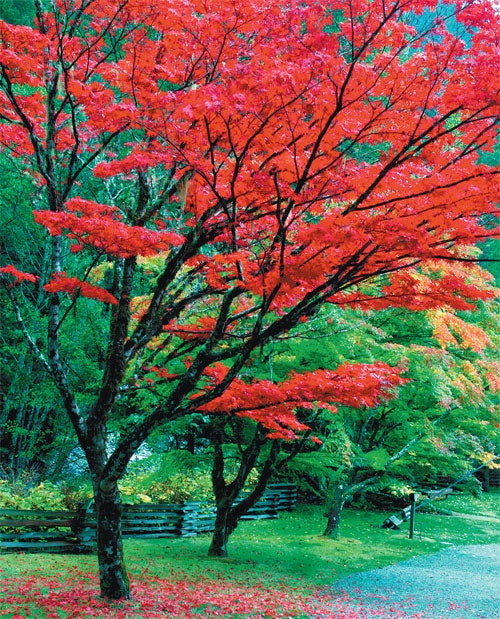Urban gardener, Cleve West: Acers high

A garden writer called recently, researching an article she was writing on acers. She wanted to know what varieties I like to use and was looking for a suitable quote. For a moment I was stumped. I couldn't think of the last time I'd planted an acer - until I remembered Acer campestre which featured in our show garden at Chelsea last year and more recently at the Clore Learning Centre at Wisley where we've planted a hedge of this British native. While acers are, without doubt, beautiful trees, I've had to ask myself why I don't use them more often.
My first introduction to the acer family was through growing bonsai trees; thereafter, Acer palmatum featured in some of my early small-town gardens, where the Japanese influence simmered gently while I found my feet. It wasn't long before this delicate (in particular A. palmatum 'Dissectum') small tree became twee with a capital "T", and even now I can't help thinking of glazed containers, cooper's barrels and stand pumps, often lumped with them in promotional displays at garden centres. So one reason for not using them more often is, I suppose, the worry that the end result might look a bit too chocolate-boxy for comfort. To milk the confectionery analogy a while longer, acers, with their delicate leaves, attractive bark and autumn colours, are like sweets after the main course - one is just right but more (in a small garden and especially where different varieties are used) risks almost certain nausea.
Some acers have a more spreading habit, so planting them in groups could be tricky in an urban scenario. But if you have the space, one such as A. palmatum 'Atropurpureum' can look stunning, as can A. japonicum 'Aconitifolium' with its autumnal hues. But with winter at our heels, snakebark maples such as A. davidii, A. rufinerve, and A. capillipes will be fanfared in the gardening press along with the paper-bark maple A. griseum. Another snakebark, A.grosseri var. hersii, is also lauded for growing relatively quickly when young established and, thereafter, happy to consolidate as a large shrub or small tree which is not too averse to the odd bit of pruning - ideal for the smaller garden. With careful siting, all could be considered for an urban space, but the important thing to remember is that they command attention, especially in the dormant season, so should be placed where they have little competition. Even mixing trees with different bark in close proximity creates a sense of disharmony and clutter.
My guess is that the palmatum variety of acers are high on the list of impulse buys that subsequently languish either in the wrong soil (they like neutral to acid), aspect (not too wet and away from drying winds), or stuck beneath a dense tree canopy because books say they don't mind a bit of shade. The palmatum varieties are also slow growing and therefore won't fulfil anyone's desire for an instant garden (unless they are willing to shell out thousands of pounds for a mature specimen).
Acer enthusiasts should note, therefore, that I'm not trying to rubbish the tree but to encourage a more considered approach. In fact, while writing this piece, I questioned my own prejudice by reviewing a planting scheme for a medium-sized garden in Dulwich, south London where the client expressed an interest in woodland plants. We thought Betula pendula offered the necessary dappled shade to a large planting bed adjacent to the terrace. Should I have given them more of a choice, though? I'm sure I suggested Amelanchier lamarckii (another favourite of mine for a small garden) but they seemed keen on birch. Did I mention acers? Almost certainly not and I felt a stab of guilt as I picked up the phone. "I was wondering whether we ought to consider using acer instead of the birch?" I faltered. Silence on the other end and then, "Well if you think they'd look better ... it's just that I've always thought them to look a bit, well, alien." I've got a horrible feeling I'll never hear from them again.
Subscribe to Independent Premium to bookmark this article
Want to bookmark your favourite articles and stories to read or reference later? Start your Independent Premium subscription today.

Join our commenting forum
Join thought-provoking conversations, follow other Independent readers and see their replies